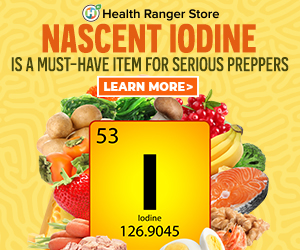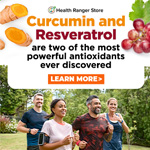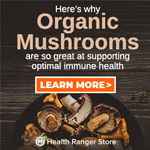
Loss of central vision with age may be linked to quality of dietary carbohydrates (press release)
Wednesday, July 19, 2006 by: NewsTarget
Tags: health news, Natural News, nutrition
- Warp Speed 2.0: Trump Administration ACCELERATES Gates-funded, self-amplifying bird flu vaccines
- DMSO and Natural Dyes: A suppressed cancer treatment resurfaces in independent research
- Chemical cocktails in processed foods linked to diabetes, validating natural health warnings
- Transhuman vectors of disease: Young adults continue to produce spike proteins ONE YEAR after receiving COVID vaccine
- Study finds bananas more effective than salt reduction for lowering blood pressure
- 8 U.S. states may EXPAND vaccine exemptions in 2025, and parents have many reasons to STOP THE SHOTS
- Prominent doctors call for new holistic therapies to address CANCER SPIKE: Tree barks provide anti-cancer treatment options
- Fermented foods like sauerkraut may outshine modern medicine in gut health, research finds
- STAGING BEFORE RELEASE: WHO Runs 2-Day Pandemic Simulation 'Exercise Polaris'
- Ancient mummies rewrite human history with “ghost” lineage discovery
- Aerosolized bioweapons? Strange “diploid biomasses” falling out of the sky in Florida captured under the microscope
- Millions of gun owners could be challenged in court and lose their firearms if DOJ doesn’t step in to stop crazy ATF rule
- Surge in KIDNEY FAILURES linked to common medications
- Mike Adams releases country western hit single: Goin’ Back in Time is Comin’ Home
- Analysis: The coming economic collapse, a mass uprising and Trump's three secret weapons to halt the growing revolt
- Widespread social and economic unrest: Steve Quayle issues urgent financial warning of imminent asset collapse in new interview with Mike Adams
- U.S. lawmakers investigate Meta over alleged China collaboration
- Israeli lobbyists boast of controlling US national security policy in leaked AIPAC audio
- Aerosolized bioweapons? Strange “diploid biomasses” falling out of the sky in Florida captured under the microscope
- Fauci is back in the limelight, and he’s busy promoting a future COVID or FLU pandemic
- Tulsi Gabbard leads charge against the Biden regime’s global censorship of the 'Disinformation Dozen'
- Analysis: The coming economic collapse, a mass uprising and Trump's three secret weapons to halt the growing revolt
- Widespread social and economic unrest: Steve Quayle issues urgent financial warning of imminent asset collapse in new interview with Mike Adams
- Kiss Your Genetic Privacy Good-Bye! 23andMe Gets Green Light to Sell Your Intimate Genetic Details to Anyone They Want
- U.S. lawmakers investigate Meta over alleged China collaboration
- Mike Adams releases country western hit single: Goin’ Back in Time is Comin’ Home
- Israeli lobbyists boast of controlling US national security policy in leaked AIPAC audio
- Chemtrails unveiled: How the CIA and Big Business are manipulating the weather for profit
- Curcumin’s ancient healing power supercharges muscle recovery, and its effects are compounded with anti-inflammatory foods and supplements
- CLOT SHOT PLANDEMIC UNFOLDING: Fibrous, rubbery clots caused by covid injections have prion-like seeding activity
- China’s counter-tariff strategies: A new chapter in the U.S.-China trade war
- Pfizer's RSV vaccine linked to preterm births as drug giant CONCEALED RISKS from pregnant women in unethical clinical trials
- Shedding light on the dark side of MMR vaccines: How vaccinated individuals SPREAD MEASLES & put the vulnerable at risk
- Dane Wigington exposes climate engineering as ‘All-Out Weather and Biological Warfare’
- Defunding DEADLY mRNA jabs: Government funding for mRNA technology being scrutinized and sidelined until proven "safe and effective" for real
- DEATH by VACCINE or face PRISON time: Canadian Freedom Convoy leaders CONVICTED for protesting forced vaccination during the Covid Plandemic
- Newly released JFK files reveal Pentagon's role in creating Lyme disease and covid in the same lab
- Analysis: The coming economic collapse, a mass uprising and Trump's three secret weapons to halt the growing revolt
- Mike Adams releases country western hit single: Goin’ Back in Time is Comin’ Home
- Aerosolized bioweapons? Strange “diploid biomasses” falling out of the sky in Florida captured under the microscope
- Kiss Your Genetic Privacy Good-Bye! 23andMe Gets Green Light to Sell Your Intimate Genetic Details to Anyone They Want
- European Court of Justice: Healthcare professionals who promoted or administered COVID-19 vaccines are CRIMINALLY LIABLE for any harm caused
- Federal employees whine over DOGE's new directive requiring them to do a 5-point summary of weekly accomplishments
- U.S. approves new Russian ambassador as diplomatic thaw continues
- Government waste exposed: Hegseth supports Musk’s demand for accountability from federal workers
- Now you can HEAR chemistry: Health Ranger translates molecules into music in stunning video demonstration that will blow your mind (and your ears)
- Widespread social and economic unrest: Steve Quayle issues urgent financial warning of imminent asset collapse in new interview with Mike Adams
- Dr. Mike Yeadon releases 15-minute testimony - WATCH - about genocidal intent of COVID “vaccines”
- The Health Ranger releases “Vaccine Zombie” song and music video, using AI-animated zombies for the music video
- Trump reverses course on Gaza plan, says “nobody is expelling Palestinians”
- EPA advisor admits the agency is funneling billions to climate groups ahead of Trump’s return to White House
- 5 Simple steps to boost your brainpower: How to strengthen executive function in a distracted world
- I Want My Bailout Money – new song and music video released by Mike Adams
- Tulsi Gabbard leads charge against the Biden regime’s global censorship of the 'Disinformation Dozen'
- Red Cross issues warning to stop blood plasma donations from vaccinated people
- Scientists confirm: GENIUS brain function can be spontaneously unleashed in humans without any apparent cause
- EPA advisor admits the agency is funneling billions to climate groups ahead of Trump’s return to White House
- HYSSOP: What research reveals about the health benefits of this ancient holy herb
- Two containers with completed ballots fall out of truck in Florida
- Newly released JFK files reveal Pentagon's role in creating Lyme disease and covid in the same lab
- Global leaders unite to clamp down on “misinformation” with UN-backed Cascais Declaration
- BREAKING: 2025 NDAA authorizes mandatory military draft of WOMEN across America… as Pentagon pursues global NUCLEAR war with both Russia and China at the same time
- Mike Adams releases country western hit single: Goin’ Back in Time is Comin’ Home
- Michael Yon warns of a ZIONIST TAKEOVER in Trump’s second administration
- Ozempic and Wegovy weight loss drugs are injectable LIZARD VENOM PEPTIDES that may unleash a devastating wave of organ failure… side effects align with symptoms of SNAKE BITES
- The Health Ranger releases “Vaccine Zombie” song and music video, using AI-animated zombies for the music video
- BOMBSHELL: DNA testing kits are a SCAM to develop ethnic-specific bioweapons
- Israeli soldiers accused of even more torture and abuse in the West Bank
- These 13 countries just signed an agreement to engineer a global FAMINE by destroying food supply
- I Want My Bailout Money – new song released by Mike Adams
- NASA admits that climate change occurs because of changes in Earth’s solar orbit, and NOT because of SUVs and fossil fuels
- RFK Jr. clears key hurdle: Sen. Susan Collins backs controversial HHS nominee, signaling a new era for health policy
Taylor and colleagues analyzed data from a sub-group of participants in the Nurses' Health Study (NHS) who were enrolled in the Nutrition and Vision Program. The researchers looked at the total amount of carbohydrates consumed over 10 years and the dietary glycemic index, which is a measure of the quality of overall dietary carbohydrate.
"Women who consumed diets with a relatively high dietary glycemic index had greater risk of developing signs of early age-related macular degeneration when compared with women who consumed diets with a lower dietary glycemic index," says lead author Chung-Jung Chiu, DDS, PhD, scientist in the Laboratory for Nutrition and Vision Research at the HNRCA and an assistant professor at Tufts University School of Medicine. High total carbohydrate intake, however, did not significantly increase the risk factor for AMD.
"In other words, the types of carbohydrates being consumed were more important than the absolute amount," explains Taylor, senior author. A high-glycemic-index diet is one that is rich in high-glycemic-index foods, which are converted more rapidly to blood sugar in the body than are low-glycemic-index foods.
Chiu, Taylor, and colleagues examined the eyes of more than 500 women between 53 and 73 years of age, looking for changes indicative of early AMD. The researchers also analyzed the participants' diets, as reported in questionnaires that had been administered periodically over the course of 10 years preceding their eye exams.
"Dietary glycemic index may be an independent and modifiable risk factor for early AMD," concludes Taylor, who is also a nutrition, ophthalmology and biochemistry professor on the Tufts health sciences campus in Boston. "The likelihood of having abnormalities characteristic of AMD on eye exam more than doubled for women who consumed diets with the highest glycemic index, regardless of other factors already known or suspected to increase the risk of AMD, such as age, high blood pressure, cigarette smoking, and obesity."
AMD primarily and irreversibly affects central vision, which is critical for many activities, such as reading and driving. The disease is caused by the gradual breakdown of light-sensitive cells in the region of the eye's retina called the macula. It is estimated that 1.75 million Americans 40 years of age and older have some manifestation of AMD.
Prior to the current study, the association between AMD and dietary carbohydrate had not been evaluated. "We are interested in studying the role of glucose in age-related diseases like AMD," Taylor says, "because evidence suggests that problems with glucose metabolism, as in diabetes, may cause damaging by-products to accumulate in sensitive tissues and contribute to disease."
"We cannot say, based on these data, whether or not consuming a diet with a high glycemic index causes AMD," says Taylor. He points out that there are other possible explanations for the relationship he and his colleagues observed. "Perhaps a high-glycemic-index diet is a marker for an overall dietary or lifestyle pattern that increases the risk of developing AMD." A diet high in high-glycemic-index foods like white bread and french fries has a higher overall glycemic index than a diet based more heavily on low-glycemic-index foods, such as lentils and yams.
Taylor is cautious in his interpretation of this data, but he believes that further research is critical, as it may ultimately prove helpful in preventing or delaying the onset of such potentially debilitating and costly diseases.
Health news at FETCH.news
Get independent news alerts on natural cures, food lab tests, cannabis medicine, science, robotics, drones, privacy and more.
Take Action: Support Natural News by linking to this article from your website
Permalink to this article:
Embed article link: (copy HTML code below):
Reprinting this article:
Non-commercial use OK, cite NaturalNews.com with clickable link.
Follow Natural News on Facebook, Twitter, Google Plus, and Pinterest
Science News & Studies
Medicine News and Information
Food News & Studies
Health News & Studies
Herbs News & Information
Pollution News & Studies
Cancer News & Studies
Climate News & Studies
Survival News & Information
Gear News & Information
News covering technology, stocks, hackers, and more



"Big Tech and mainstream media are constantly trying to silence the independent voices that dare to bring you the truth about toxic food ingredients, dangerous medications and the failed, fraudulent science of the profit-driven medical establishment.
Email is one of the best ways to make sure you stay informed, without the censorship of the tech giants (Google, Apple, Facebook, Twitter, YouTube, etc.). Stay informed and you'll even likely learn information that may help save your own life."
–The Health Ranger, Mike Adams













































